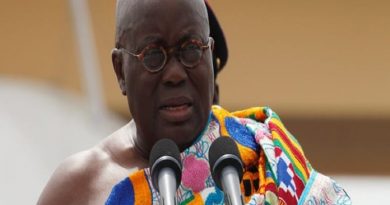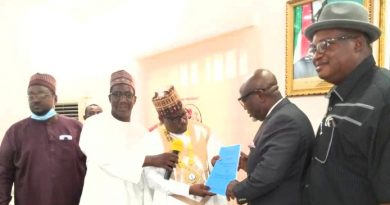Many Nigerians are still honest, says cab man return valuables, cash
Oru Leonard
An Abuja-based taxi driver, who returned a bag containing cash and other valuables forgotten in his cab to the owner, says there are many Nigerians with high levels of integrity.
Hassan Abubakar returned the sum of N50,000, a laptop, golden earrings, an international passport, a power bank and ATM cards belonging to Professor Margaret Araoye, who forgot the items in the taxi cab.
PRIMORG joined in celebrating Abubakar for his act of integrity by inviting him to talk on PUBLIC CONSCIENCE, the anti-corruption program on Wednesday in Abuja.
“Na wetin I suppose to do be that,” he said in pidgin English, meaning ‘That is what I am supposed to do’ when asked why he decided to locate the owner and return the items. He added that the money and the other things were left in his taxi cab, saying he was supposed to locate the owner and return the cash and other valuables.
“That was what I did,” Abubakar said
He said the act of returning the items was not a difficult one for him because staying upright in character has become a routine for him.
Abubakar was of the opinion that despite the pervasive nature of corruption in Nigerians, there are still citizens with a high level of integrity.
Other participants during the radio program commended Abubakar for his uprightness and high level of integrity and encouraged Nigerians to emulate him.
They lamented that the government was not doing enough to halt the pervasive corruption in the public sector.
The Project Coordinator, Akin Fadeyi Foundation, AFF, Patience Hyeladzira Ismaila, advised President Bola Tinubu-led government and anti-corruption agencies to take a tough stance against corruption to deter public officers from taking to corrupt acts.
Ismaila, while lamenting that corruption has been institutionalized in Nigeria, stressed that strict policies and application are vital if the government wants to fight public sector corruption. She insisted that the government of the day must put in place measures to ensure there are repercussions for corrupt acts against public officials and citizens.
“Measures should be put in place, and People should be publicly punished and held accountable for whatever they are doing.
“In a community where you feel like you can get diplomatic immunity, I feel like people should be treated like every Nigerian. If you steal, it should be said that you stole, the same way when ordinary people do the wrong thing and get punished, people at the top level should get the same treatment.
“Bodies like the ICPC, the EFCC, and the Code of Conduct Bureau should be loud when somebody has committed a crime and when there are always repercussions, corrupt practices will reduce, “Ismaila noted.
She, however, urged the Federal Government to address rising poverty and food crises, which are affecting a lot of Nigerians and driving some people into crime and wrongdoings, while urging Nigerians to focus on being trustworthy, abstain from fraud and report corrupt acts.
“There needs to be institutionalization of anti-corruption in our society. Nigerians should focus on being trustworthy and patriotic regardless of status. I believe that it always pays to be a good person. It always pays to be honest. So people should abstain from corrupt practices and report corrupt practices because it’s not enough to abstain from it.“ Ismaila advised.
Likewise, Programme Officer, Accountability Lab Nigeria, Mnenga Shiiuwa, while underscoring the importance of stringent punishment against corruption in the public sector, alleged that recruitments into civil service are fraught with massive irregularities and racket.
Shiiuwa added that Nigeria’s challenge is that corruption has eaten into the fabric of the society despite the numerous laws of the land meant to prevent and fight it.
“We have a big problem with the public service, and the solution has to begin with the recruitment process.
“To the best of my knowledge, in the last 15 years, we haven’t had a fair recruitment process in the Nigerian public service. Almost every person in every single agency of government that found his or herself there came through a connection, and what that means is that their allegiance is not to the service but to the people who brought them in -this has to be addressed, or otherwise, we keep having a repeat of dishonest, untruthful public servants in our country.” He said.
Shiiuwa called on citizens, religious and traditional institutions to play a key role in moulding an upright society.
Public Conscience is a syndicated weekly anti-corruption radio program PRIMORG uses to draw government and citizens’ attention to corruption and integrity issues in Nigeria.
The program has the support of the MacArthur Foundation.
(PRIMORG Media)




